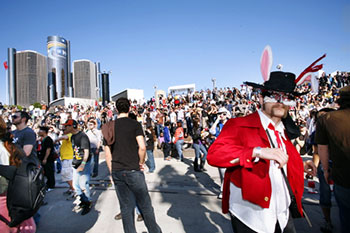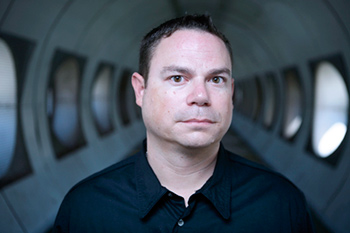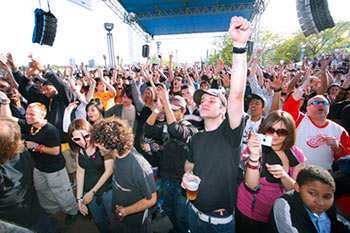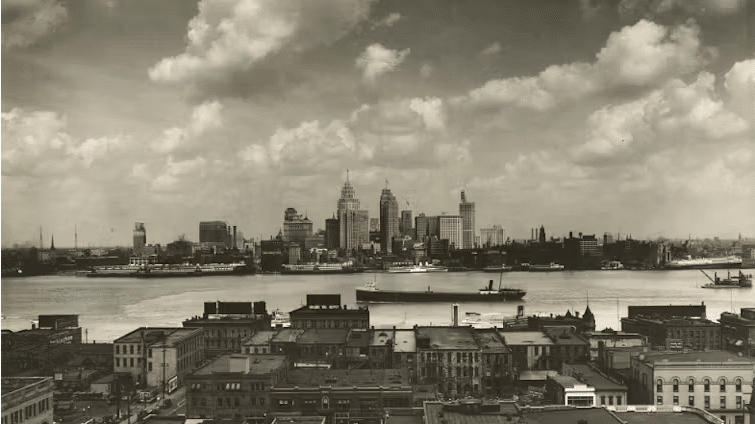Fast Company: Paxahau’s Jason Huvaere Dishes as Movement Gets Things Shakin’ Downtown
Jason Huvaere made his passion — electronic music — his business. This weekend, the techo entrepreneur and head of Paxahau Event Productions will watch throngs of fellow fans dance and revel at the Movement festival in Hart Plaza. We catch up with him for a few fast questions.
Some music fans dream of finding a way to nudge their way into the
business. Jason Huvaere, president and co-founder
of Paxahau Event Productions,
actually found the path, and we all get to dance to the result this weekend.
 Huvaere started off just as a fan of electronic music. He formed Paxahau as a
Huvaere started off just as a fan of electronic music. He formed Paxahau as a
passion project. That turned into full-time gig and eventually a
full-time start-up.
Today Paxahau employs 10 people, 20 interns, and runs Movement: The Detroit Electronic Music Festival, which takes over Hart Plaza downtown this weekend, and attracts an international array of musicians and electronic music fans.
Huvaere is at the center of it all. The 35-year-old has plans to
further expand Movement and Paxahau with a record label and other
Internet-based features.
Describe your business in two sentences or less?
In
1998 we turned our love for electronic music into a career when we
launched Paxahau.com. Paxahau is now a full service events and
promotions company that is capable to produce large-scale events such
as Movement and corporate events such as the Auto Dealers After-Party
we did for the 2009 NAIAS.
Why did you decide to set up shop in Detroit? I
I
was born in SE Michigan and Detroit is where I consider home. Downtown
Detroit has been a source of inspiration and interest since we first
started dabbling in events back in 1993. I am not sure if I can
accurately describe the “bug” once you get it, but no other place feels
like Detroit. Despite all of its challenges, when a great thing happens
here, you can really feel it. Detroit is a big small town, and it feels
more like family than a city sometimes. I like work getting NOTICED
here, whether it’s ours or the work of someone else. Detroit is just a
unique place to do something special and it makes a difference.
What are some of the advantages to doing business here?
The
small town aspect really helps communicate ideas and promotions here. I
like being able to come up with an idea and execute it within a short
time period. You can really wrap your arms all the way around Detroit,
and that is a special feeling.
What do you see in Detroit that other people who live outside the city don’t?
I
don’t know if it’s a “see” rather than a “feel.” Detroit in my
generation has always been about one thing more than anything else –
hope. This feeling of hope is what fuels the ideas, events and overall
vision of our organization as well as most people we know that are
actively involved in Detroit.
 What advice would you give to someone who was thinking about opening a business in the Motor City?
What advice would you give to someone who was thinking about opening a business in the Motor City?
Don’t
get too arrogant no matter how good you think you are or your idea is.
Look into the long vision not the short, and don’t be afraid to ask for
advice or hire an experienced consultant. Detroit is a blank canvas
right now in a lot of areas and it’s a great opportunity for anyone
willing to take the risk and love Detroit.
If you could change one thing about Detroit, what would it be?
The
population. Although we are great small town, the emptiness of downtown
is one of Detroit’s biggest challenges. All things economically relate
to commerce and commerce relates to population and market. The suburbs
can be downtowns biggest cheerleaders and a lot has been done to
promote Detroit, but without hundreds of thousands of new residents or
the city being cut up into smaller cities we will always have the same
challenges we have now. We need a huge injection of people and energy
to change the chapter into the vision most people refer to when
discussing Detroit’s renaissance.
Jon Zemke’s Fast Company profiles — spotlights on Detroit entrepreneurs — appear regularly in the Innovation and Job News section of Model D. Send feedback here.




